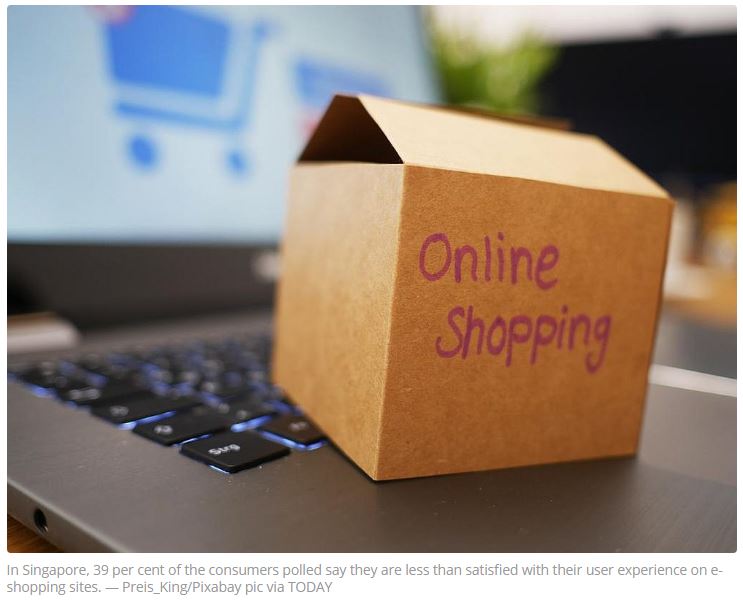4 in 10 Singapore consumers less than satisfied with online shopping experience despite jump in spending
SINGAPORE, Sept 22 — Despite spending more when shopping online during the Covid-19 outbreak, about four in 10 Singaporean consumers are not satisfied with the experience, a recent study found.
Major e-commerce brands such as Shopee, Qoo10 and Lazada were also rated lowly in terms of consumer satisfaction by Singaporeans polled, despite higher usage rates.
These findings were released on yesterday by market research consultancy Blackbox and survey firm Toluna, based on research done in June this year.
It analysed the sentiments, expectations and behaviours of 4,780 consumers across Singapore, Indonesia, Malaysia, the Philippines, Thailand and Vietnam, in order to examine the impact of digital commerce, as well as the emerging trends in the digital economy and how businesses in the region may build longer-term trust among the communities they serve.
Within Singapore, 39 per cent of the consumers polled online said that they were less than satisfied with their user experience on e-shopping sites, adding that delivery costs, product prices and delivery time could be better improved.
The study also found that 63 per cent of Singaporeans spent more online during the pandemic, though the report did not specify the exact months. The total spending for the average Singaporean consumer increased by 31 per cent compared to before the pandemic, the report said, without giving any figures on the amounts spent.
Yashan Cama, international commercial director of Blackbox Research, said that the study confirmed a significant change in consumer behaviour in recent months, driven by an increasing necessity to shop online.
This spike in online spending means that e-commerce sites are enjoying higher usage rates, which come with greater scrutiny by consumers.
For example, online shopping sites such as Qoo10 and Lazada fall on the lower end in terms of consumer satisfaction, with 41 per cent of respondents saying that they were not satisfied when shopping with Qoo10 and 39 per cent for Lazada. Shopee performed average on the spectrum at 52 per cent.
Cama warned that consumer frustrations about service quality could make or break major e-commerce brands.
“We expect some of these cornerstone brands to experience a shake-up in the coming months if these existing problems are not quickly addressed. Consumers will only become more discerning in future.
“With 5G technology on the verge of transforming platform capabilities, current market leaders may wake to find themselves no longer at the front of that queue if they don’t address concerns and work to deliver a more frictionless experience,” he said.
Cama added that this presents a unique opportunity for Singapore to act as the “innovation incubator” for brands to develop best-in-class e-commerce platforms and services to address these newfound challenges.
Supporting homegrown brands
With the pandemic taking a toll on the global economy, the study found a shift in consumer sentiment towards homegrown brands.
Driven by a desire to strengthen their own communities and economy, 78 per cent of consumers here said that they were more likely to support Singapore brands in the future.
Domestic brands such as NTUC FairPrice and Sheng Siong supermarkets have emerged as top homegrown players, with high satisfaction levels given by consumers during the Covid-19 crisis.
The study also tried to find out which are the top five “virtuous” companies among respondents. These are companies, whether domestic or international, that leveraged new opportunities, made an effort to engage with the community and demonstrated their commitment to helping during the crisis.
Respondents from Singapore listed FairPrice, Sheng Siong, DBS bank, fast-food chain McDonald’s and video-conferencing platform Zoom among their top five.
“‘International’ might be on the verge of becoming a dirty word,” Cama said, adding that FairPrice and Sheng Siong have stepped up to the plate in April and May to manage customers and meet their needs in the best possible way. This was during the time of the circuit breaker when non-essential businesses here were halted.
“The resurgence in national pride can also be attributed to consumers looking to support their own economy. They are increasingly choosing to shop local over international,” Cama said.
“International companies will need to reassess their brand portfolios and seriously consider how they can localise their brands to reflect the values that matter most to Singaporean consumers.”
Other findings
Around six in 10 consumers across the Association of South-east Asian Nations (Asean) said that they are more satisfied with digital living now compared to more traditional offline living before the pandemic.
The proportion is also about six in 10 (61 per cent) for Singapore respondents, and highest in Thailand (68 per cent) but lowest in Indonesia (22 per cent).
Generation X and Baby boomers are marginally more satisfied with this change relative to Generation Z, which is typically defined as the generation born after 1996 or coming after the millennials.
The Blackbox report stated that this is potentially an indication of Gen Z reaching a potential saturation point when it comes to digital living — that having been effectively the first generation of digital natives, they are missing offline “experiences” that may be novel and less routine. — TODAY
Source: https://www.malaymail.com/news/singapore/2020/09/22/4-in-10-singapore-consumers-less-than-satisfied-with-online-shopping-experi/1905407


 English
English




